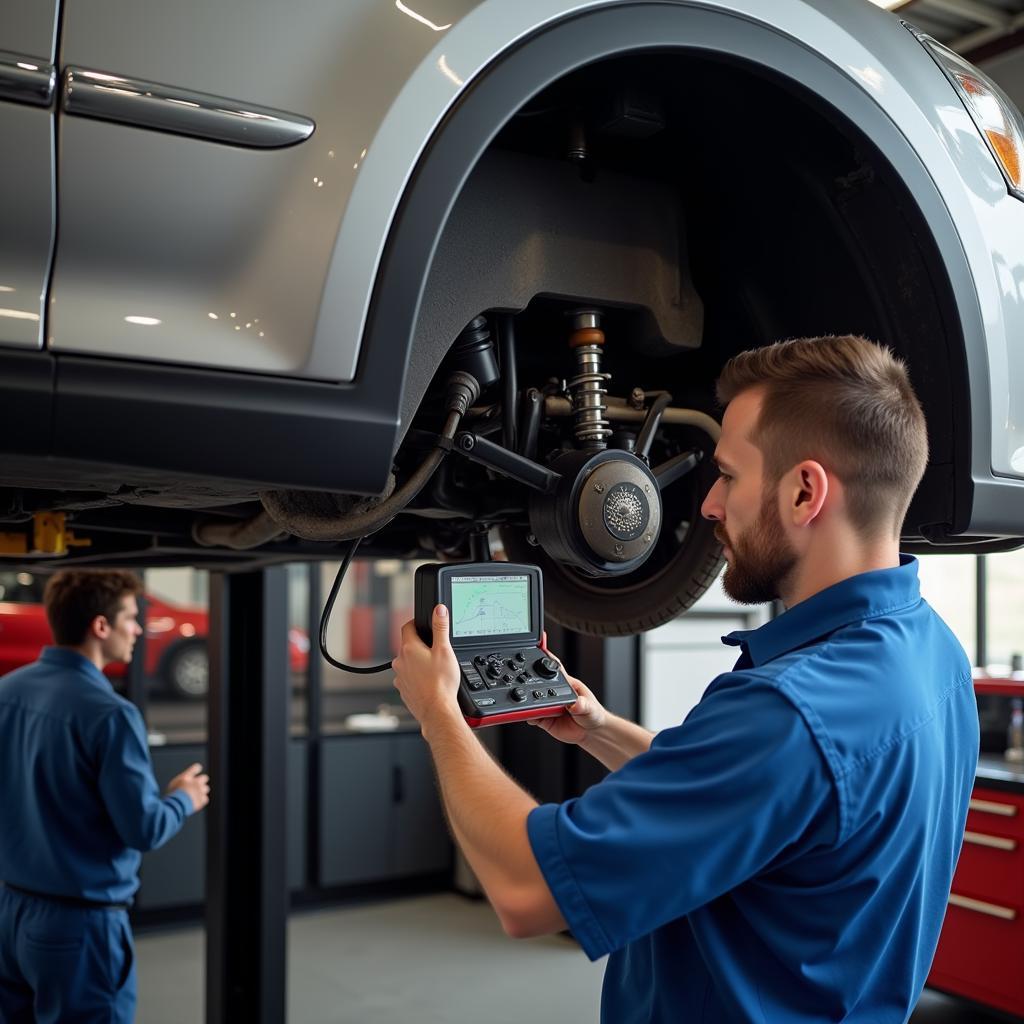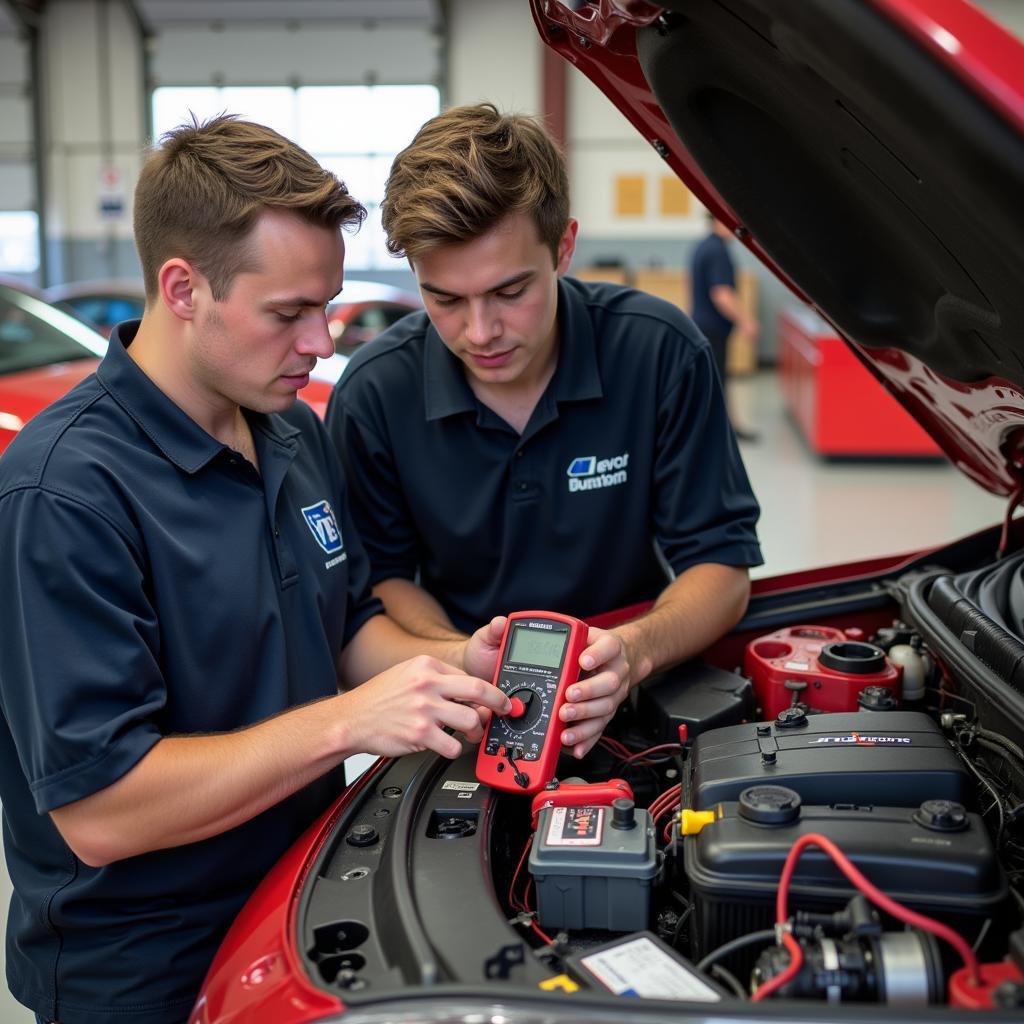Taking care of your car is crucial for its longevity, safety, and overall performance. Whether you’re a seasoned driver or a novice, understanding the fundamentals of car maintenance is vital. Regular maintenance helps prevent costly repairs, improve fuel efficiency, and ensure your car runs smoothly for years to come. This guide offers essential car maintenance tips for car owners, repair shop owners, and automotive technicians.
Basic Car Maintenance Checklist
Let’s start with the basics. Every car owner should be familiar with these essential maintenance tasks:
1. Regularly Check Your Fluids
Checking your car’s fluids is essential for maintaining its health. These fluids lubricate, cool, and protect different parts of your engine and transmission. Here’s a quick breakdown:
- Engine Oil: The lifeblood of your engine, engine oil lubricates moving parts, reducing friction and wear. Check your oil level regularly using the dipstick and change it according to the manufacturer’s recommendations.
- Coolant: This fluid prevents your engine from overheating. Check the coolant level in the reservoir and ensure it’s within the designated range.
- Brake Fluid: This critical fluid transmits pressure to the brakes, ensuring proper braking. Check the brake fluid level in the reservoir and top it off when needed.
- Transmission Fluid: This fluid lubricates and cools your transmission. Check the transmission fluid level and color for any signs of contamination.
- Power Steering Fluid: This fluid assists in steering. Check the power steering fluid level and look for leaks.
2. Tire Care and Maintenance
Your tires are your car’s connection to the road. Proper tire maintenance is crucial for safety and performance:
- Tire Pressure: Maintaining the correct tire pressure is vital for fuel efficiency, handling, and tire wear. Check your tire pressure regularly using a tire pressure gauge and inflate them to the recommended pressure listed in your owner’s manual.
- Tire Tread Depth: Tread depth ensures proper grip and traction. Check the tread depth using a tread depth gauge or a penny trick. If the tread depth is below 2/32 inch, it’s time for new tires.
- Tire Rotation: Rotating your tires helps ensure even wear. Have your tires rotated every 5,000-7,500 miles.
3. Battery Maintenance
Your car’s battery provides the power to start your engine. Here’s how to ensure it’s in good condition:
- Battery Terminals: Check the battery terminals for corrosion. Clean them with a baking soda solution and water to ensure good electrical conductivity.
- Battery Voltage: Have your battery tested periodically to check its charge level and capacity.
4. Air Filter
The air filter keeps dust, dirt, and debris from entering your engine.
- Air Filter Inspection: Inspect the air filter regularly and replace it if it appears dirty or clogged.
- Air Filter Replacement: Replace the air filter according to the manufacturer’s recommendation, typically every 12,000-15,000 miles.
5. Regular Inspections and Service
- Scheduled Maintenance: Adhere to your car’s recommended maintenance schedule outlined in the owner’s manual. This includes oil changes, filter replacements, and other crucial inspections.
- Professional Inspection: Take your car for regular inspections by a qualified mechanic. This helps catch potential issues early, preventing more significant and costly repairs down the line.
Advanced Car Maintenance Tips
As you gain experience with car maintenance, you can explore these additional tips for optimal performance and longevity:
1. Engine Tune-up
An engine tune-up involves adjusting and cleaning various components to improve performance and fuel efficiency.
- Spark Plugs: Spark plugs ignite the fuel-air mixture in the cylinders. Replacing worn spark plugs can improve engine performance and fuel economy.
- Fuel Injectors: Fuel injectors deliver fuel to the engine cylinders. Cleaning or replacing faulty injectors can help restore optimal engine performance.
- Air Filter: As mentioned earlier, a clean air filter ensures proper air intake and efficient combustion.
2. Suspension and Steering
A properly functioning suspension and steering system ensures stability and responsiveness.
- Suspension Components: Check your suspension components for wear or damage. This includes shock absorbers, struts, control arms, and ball joints.
- Steering Components: Inspect your steering components for wear or leaks. This includes power steering fluid level, steering rack, and tie rod ends.
3. Brake System Maintenance
Your brakes are essential for safety. Regular maintenance is crucial:
- Brake Pads and Rotors: Check the brake pads and rotors for wear. Replace them if necessary to maintain optimal braking performance.
- Brake Fluid: Brake fluid absorbs moisture over time, which can compromise braking performance. Flush and replace the brake fluid regularly to ensure its effectiveness.
4. Cooling System
A properly functioning cooling system prevents your engine from overheating.
- Coolant Level: Check the coolant level regularly and top it off as needed.
- Cooling System Flush: Flush and replace the coolant regularly according to the manufacturer’s recommendation.
5. Regular Cleaning
Keeping your car clean is more than just aesthetics.
- Exterior Cleaning: Wash your car regularly to remove dirt, grime, and road salt, which can damage the paint and bodywork.
- Interior Cleaning: Clean the interior regularly to prevent dirt and debris buildup.
Common Car Maintenance Mistakes to Avoid
- Ignoring Warning Lights: Never ignore warning lights on your dashboard. They indicate potential issues that need immediate attention.
- Delaying Maintenance: Don’t delay scheduled maintenance. Putting off essential tasks can lead to more significant problems and higher repair costs.
- Using the Wrong Fluids: Always use the correct fluids recommended by your car’s manufacturer. Using the wrong fluids can damage your car’s engine and other components.
- Overlooking Minor Issues: Don’t ignore small issues like squeaks, rattles, or strange noises. These can be early signs of a bigger problem.
What to Do When Your Car Needs Repairs
- Find a Reputable Mechanic: Do your research and choose a qualified mechanic with a good reputation. Check online reviews and ask for recommendations from friends and family.
- Get a Written Estimate: Always request a written estimate before any major repairs. This helps prevent unexpected charges.
- Ask Questions: Don’t hesitate to ask your mechanic any questions you have about the repairs. Understanding the problem and the repair process can save you money and frustration.
“Car maintenance is an ongoing process, not a one-time event,” says John Smith, a certified automotive technician with over 20 years of experience. “Regular maintenance helps ensure your car runs smoothly and safely for many years to come.”
“Investing in car maintenance is investing in peace of mind,” adds Sarah Johnson, owner of a local repair shop. “It prevents costly repairs down the line and ensures your car is safe to drive.”
Conclusion
Car maintenance is a crucial aspect of owning a vehicle. By following these tips and adhering to your car’s maintenance schedule, you can extend the life of your car, improve its performance, and keep it running smoothly for years to come. If you have any questions or require assistance, contact us at +1 (641) 206-8880 or visit us at 500 N St Mary’s St, San Antonio, TX 78205, United States.
Frequently Asked Questions (FAQs)
1. How often should I change my car’s oil?
The frequency of oil changes varies depending on the type of oil, driving conditions, and the manufacturer’s recommendations. However, most car owners should change their oil every 3,000-5,000 miles.
2. What are the signs of a bad battery?
Signs of a bad battery include slow engine cranking, dimming headlights, clicking noises when starting, and the battery warning light illuminating on the dashboard.
3. How can I check my car’s tire pressure?
You can check your tire pressure using a tire pressure gauge. The recommended tire pressure is listed in your car’s owner’s manual.
4. What are the benefits of regular car maintenance?
Regular car maintenance offers numerous benefits, including improved fuel efficiency, enhanced safety, longer vehicle lifespan, and reduced repair costs.
5. How can I find a reputable mechanic?
To find a reputable mechanic, ask for recommendations from friends and family, read online reviews, and check the mechanic’s certifications and experience.
6. Should I buy a used car with high mileage?
While high mileage cars can be more affordable, it’s crucial to consider the vehicle’s maintenance history and overall condition before making a purchase.







Leave a Reply